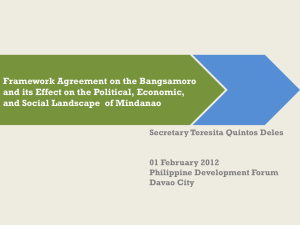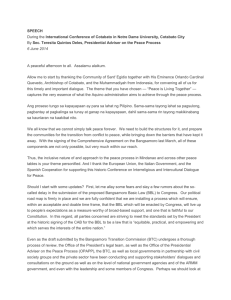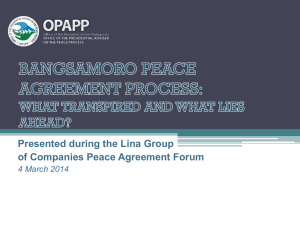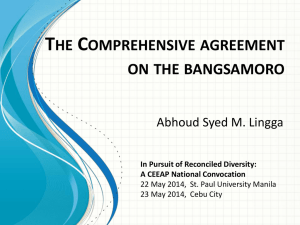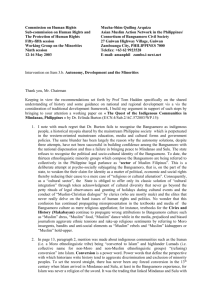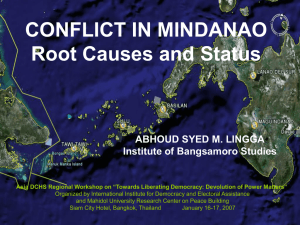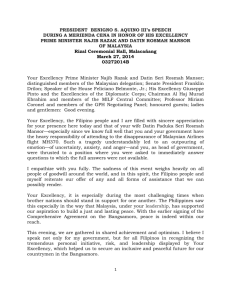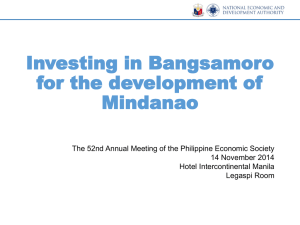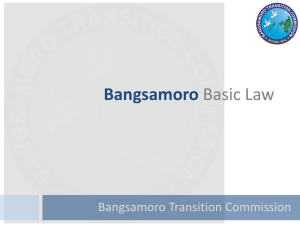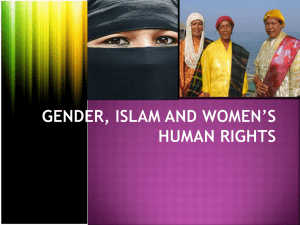Frequently Asked Questions on the draft Basic Law Article I Name
advertisement
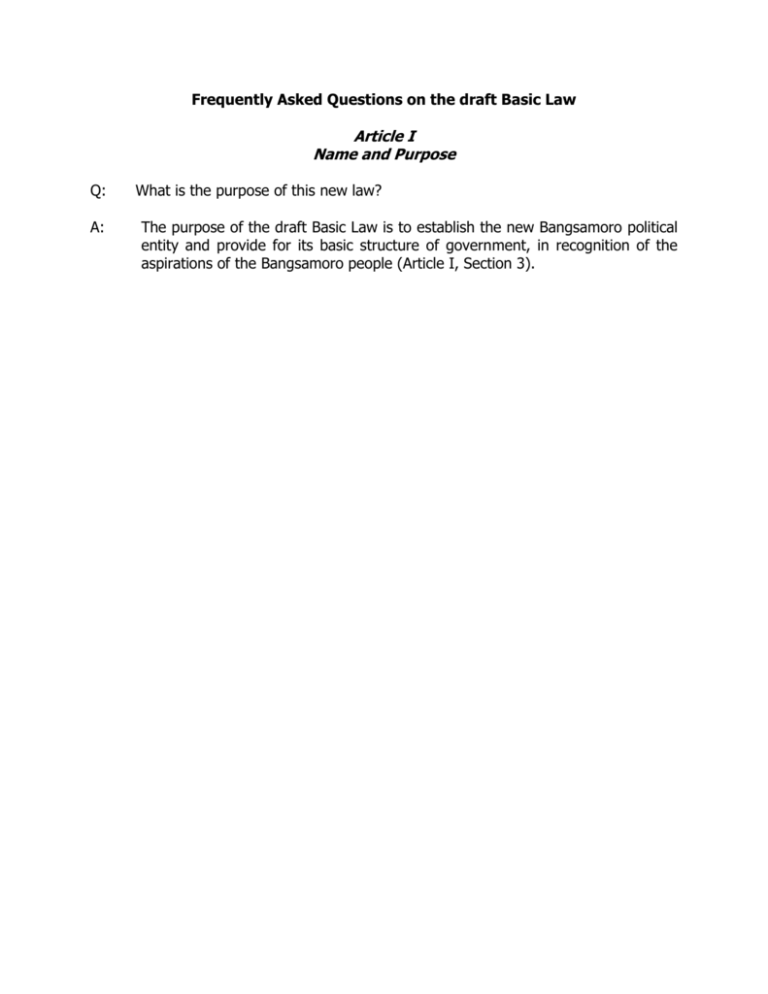
Frequently Asked Questions on the draft Basic Law Article I Name and Purpose Q: A: What is the purpose of this new law? The purpose of the draft Basic Law is to establish the new Bangsamoro political entity and provide for its basic structure of government, in recognition of the aspirations of the Bangsamoro people (Article I, Section 3). Article II Bangsamoro Identity Q: Who are the Bangsamoro people? A: Those who at the time of conquest and colonization were considered natives or original inhabitants of Mindanao and the Sulu archipelago and its adjacent islands including Palawan, and their spouses, and descendants, who have identified themselves as Bangsamoro (Article II, Section 1). Q: Why is it necessary for the Bangsamoro to have an official flag? A: A Philippine government entity, such as the Bangsamoro, is authorized to have its own flag under Section 44 of Republic Act No. 8491, otherwise known as the Flag and Heraldic Code of the Philippines. 2 Article III Territory Q: What comprises the Bangsamoro territory? A: The Bangsamoro territory is composed of the land mass, maritime, terrestrial, alluvial and aerial domain. Section 1 expressly states that the Bangsamoro territory remains part of the Philippines. Likewise, the draft Basic Law provides that the Bangsamoro shall respect and adhere to the Philippines’ international treaties and agreements. Thus, whatever power the Bangsamoro may exercise over its territory must be consistent with and not contravene the country’s international obligations and commitments (Article IV, Section 8). The local government units that will comprise the Bangsamoro territory will be determined through a plebiscite for the ratification of this Basic Law (Article XV, Section 3). Q: What is the extent of the Bangsamoro’s maritime jurisdiction? A: The Bangsamoro has jurisdiction over waters that extend up to 12 nautical miles from the low-water mark of the coasts. This is referred to as the Bangsamoro Waters – where the Bangsamoro Government is granted certain rights over the resources therein (Article III, Section 5). 3 Article IV General Principles and Policies Q: The draft Basic Law provides that the Bangsamoro Government will have a parliamentary form of government. Is this consistent with a democratic form of government provided in the 1987 Philippine Constitution? A: Yes, a parliamentary system is democratic. A parliamentary system is a form of government where the executive is formed by the legislature, i.e. the Chief Executive (who is the head of the executive) is elected by the legislature. A democracy is a system of government which derives its legitimacy from the people. Hence, eligible citizens participate, directly or indirectly, in the election of their representatives in government. Under the draft Basic Law, the Bangsamoro Government is democratic because all members of Parliament will be elected as representatives of the Bangsamoro People. Consistent with the 1987 Philippine Constitution, both the executive and the legislative in a parliamentary system shall be elective and representative of their constituent political units (Article VII). Q: Is a parliamentary form of government allowed by the 1987 Philippine Constitution? A: Yes, the 1987 Philippine Constitution left it to the wisdom of Congress to determine the appropriate government structures for local government units and autonomous regions. Specifically, Section 18, Article X of the 1987 Philippine Constitution provides that the Organic Act (the Basic Law in the case of the Bangsamoro) for Autonomous Regions ―shall define the basic structure of government consisting of the executive department and the legislative assembly.‖ 4 Article V Powers of Government Q: What do the terms ―reserved‖, ―exclusive‖, and ―concurrent‖ mean? A: Reserved powers are matters over which authority and jurisdiction are exercised by the National Government. The reserved powers enumerated in the Annex on Power Sharing remains the same. Only the National Government can exercise power or authority over national defense and security, foreign relations, monetary policy, and customs and tariffs among others. Concurrent powers refer to the powers shared between the National Government and the Bangsamoro Government. In the exercise of these concurrent powers, the concerned ministries of the Bangsamoro Government are required to cooperate and coordinate with the National Government. Exclusive powers are matters over which authority and jurisdiction pertain to the Bangsamoro Government (Article V, Sections 1 to 4). All issues that may result in a dispute between the National and Bangsamoro Governments, or may arise from the exercise of powers enumerated in Article V, shall be resolved by an intergovernmental relations mechanism. Unresolved issues shall be elevated to the President through the Chief Minister (Article VI). Q: The draft Basic Law creates Bangsamoro offices that exercise functions related to those vested in constitutional bodies. How will these bodies relate to each other? A: The draft Basic Law creates the following bodies: (i) The Bangsamoro auditing body which shall have auditing responsibility over public funds utilized by the Bangsamoro Government without prejudice to the power, authority, and duty of the national Commission on Audit to examine, audit, and settle all accounts pertaining to the revenues and the use of funds and property owned and held in trust by any government instrumentality, including GOCCs (Article V, Section 2, Number 7); (ii) The Bangsamoro Civil Service Office which shall develop and administer Bangsamoro government employees and officers without prejudice to the Civil Service Commission’s powers (Article V, Section 2, Number 8); 5 (iii) The Bangsamoro Electoral Office which shall be part of the Commission on Elections (Article VII, Section 9); (iv) The Bangsamoro Police which shall be part of the Philippine National Police (Article XVI, Section 2); (v) The Bangsamoro Commission on Human Rights (BCHR) which shall have investigatory and prosecutorial powers; In the performance of its functions, the BCHR may coordinate with the Commission on Human Rights (Article IX, Section 7); (vi) The Bangsamoro Regional Police Board which shall be part of the NAPOLCOM and will perform the functions of the NAPOLCOM in the region (Article XVI, Sections 5, 6). Q: What is the scope of the Bangsamoro Government’s powers over financial and banking systems in the Bangsamoro? A: Without prejudice to the power of supervision of the Bangko Sentral ng Pilipinas, the Bangsamoro Government shall encourage the development of Islamic Banking. Under the draft Basic Law, a Shari’ah supervisory board may be created specifically for this purpose. Towards this end, the Bangsamoro Government is also authorized to participate in the management of the AlAmanah Islamic Investment Bank. (Article V, Section 3, Number 13; Article XII, Sections 30, 36) Q: What is the scope of the Bangsamoro Government’s regulatory power over power generation, transmission, and distribution? A: The draft Basic Law allows the Bangsamoro Government the power to regulate power generation, transmission, and distribution facilities in the Bangsamoro which are not connected to the Grid. Through this authority, it is endeavored that the Bangsamoro Government will be able to spur the establishment of generation and other power facilities in the area that will allow them to address the needs of the inhabitants of the Bangsamoro (Article 5, Section 3, Number 15). Q: What is the scope of the Bangsamoro Government’s power to create, divide, merge, abolish, or substantially alter boundaries of local government units? A: The power to create, divide, merge, abolish, or substantially alter boundaries of local government units granted to the Bangsamoro Parliament is consistent with the power granted to other local government units in Sections 6 to 10 of Chapter 6 II, Title I of the Local Government Code of 1991 and is similarly subject to the limitations provided by the 1987 Philippine Constitution. Q: What will happen to the powers granted to the ARMM under Republic Act No. 9054? A: Republic Act No. 9054 will be expressly repealed by the enactment of the Basic Law. However, the draft Basic Law adopts certain powers already devolved to the ARMM (Article V, Section 4), which are enumerated under Art. V, Section 4. The Annex on Power Sharing specifically allows the Bangsamoro Transition Commission—that prepared the draft Basic Law—to select powers under Republic Act No. 9054 relevant to the Framework Agreement on the Bangsamoro, and adopt these in the Basic Law. 7 Article VI Intergovernmental Relations Q. Describe the relationship between the National and Bangsamoro Governments. A. The relationship between the National and Bangsamoro Governments shall be asymmetric. It is asymmetric because it is distinct from the relationship between the National Government and other local government units. Specifically, the 1987 Philippine Constitution (Article X, Section 20) confers the Bangsamoro Government, as an autonomous region, legislative powers over such matters as administrative organization and ancestral domain—which are not granted to local government units. However, similar to local government units, the President’s power of general supervision remains (Article VI, Sections 1, 3). Q: What is the Intergovernmental Relations Mechanism? A: A ―Central Government – Bangsamoro Government Intergovernmental Relations Body‖ shall be established to resolve any issues that may arise relating to the exercise of the respective powers of the National Government and the Bangsamoro Government within the Bangsamoro through consultations and continuing negotiations in a non-adversarial manner. All unresolved issues shall be elevated to the President, through the Chief Minister (Article VI, Section 4). The draft Basic Law also provides for a Philippine Congress – Bangsamoro Parliament Forum for purposes of cooperation and coordination of legislative initiatives (Article VI, Section 8). Q. Describe the relationship between the Bangsamoro Government and its constituent local government units. A. The National and Bangsamoro Governments accept the concept of devolution as inspired by the principles of subsidiarity. The provinces, cities, municipalities, barangays, and geographic areas within its territory shall be the constituent units of the Bangsamoro. The privileges already enjoyed by the local government units within the Bangsamoro under existing laws shall not be diminished unless otherwise altered, modified, or reformed for good governance in a law to be enacted by the Bangsamoro Parliament (Article VI, Sections 6, 7). To ensure mutual cooperation and cohesion between the Bangsamoro Government and its constituent LGUs, a Council of Leaders shall likewise be established (Article VI, Section 5). 8 Q: Is the National Government giving the Bangsamoro undue preference for positions in National Offices? A: No. Although, it shall be the policy of the National Government to appoint competent and qualified inhabitants of the Bangsamoro in certain National Government offices [at least one (1) Cabinet Secretary; at least one (1) in each of the other departments, offices, and bureaus holding executive__primarily confidential, highly technical, and policy-determining__positions; and one (1) Commissioner in each of the constitutional bodies (Article VI, Section 9); at least one (1) justice in the Supreme Court; and two (2) justices in the Court of Appeals (Article X, Section 27)]. This does not remove the discretion of the President to appoint qualified persons from other sectors. 9 Article VII Bangsamoro Government Q: What is the relationship between the Bangsamoro Electoral Code and Batas Pambansa Bilang 81, otherwise known as the Omnibus Election Code? A: The Bangsamoro Electoral Code will be enacted to specifically govern parliamentary elections in the Bangsamoro and shall be correlated to all national election laws including Batas Pambansa Bilang 81 (Article VII, Section 9). Q: What is the composition of the Bangsamoro Parliament? How are seats in the Bangsamoro Parliament classified and allocated? A: The Bangsamoro Parliament shall have at least sixty (60) members – fifty percent (50%) of which shall be elected through a system of proportional representation; forty percent (40%) from single member districts; and ten percent (10%) will be elected to reserved seats representing key sectors in the Bangsamoro. The Bangsamoro Parliament shall have two reserved seats each for non-Moro indigenous communities and settler communities. Women shall also have a reserved seat (Article VII, Sections 4, 5). Q: What is the process for the filling of reserved seats for IPs/ICCs? A: Reserved seats for non-Moro indigenous peoples shall be filled pursuant to their customary laws and indigenous processes (Article VII, Section 6). Q: How does a member of the Bangsamoro Parliament forfeit his/her seat? A: A member of the Bangsamoro Parliament shall forfeit his/her seat if: (i) He or she resigns voluntarily through a written or oral declaration in Parliament; (ii) He or she is convicted of a grave offense as stipulated in the House Rules that the Bangsamoro Parliament will promulgate; or treason, high crimes, heinous crimes, crimes against morality, or other crimes punishable by more than six (6) years; (iii) He or she becomes permanently physically or mentally incapacitated and is unable to discharge his/her duties as a Member of the Parliament or dies while in office; 10 (iv) He or she, having been elected under the proportional representation system, is replaced with another member by the party to which he/she belongs with; (v) He or she, having been elected under the proportional representation system, transfers to another party during his/her incumbency as member of the Bangsamoro Parliament; (vi) Such other grounds as may be provided under the Bangsamoro Electoral Code (Article VII, Section 16). Q: How will the vacancy created by the forfeiture be filled? A: A vacancy in a Proportional Representation Seat shall be filled by the party to which that seat belongs. A vacancy in a District Seat previously occupied by a member affiliated to a party shall be filled by that party, who shall nominate a replacement. A vacancy in a District Seat previously occupied by an unaffiliated member shall be filled through a special election conducted in the manner prescribed by law enacted by the Bangsamoro Parliament (Article VII, Section 17). Q: Can any political party run in the Bangsamoro elections? A: No, only regional political parties that are duly accredited by the Bangsamoro Electoral Office may participate in the parliamentary elections in the Bangsamoro (Article VII, Section 7). Q: How long is the term of office of the members of the Parliament? A: A Member of the Parliament shall serve for three (3) years, unless otherwise provided by law passed by the Bangsamoro Parliament. However, no member shall serve for more than three consecutive terms (Article VII, Section 11). Q: What are the qualifications of the Members of the Parliament? A: A member of the Bangsamoro Parliament must be a citizen of the Philippines; at least twenty-five (25) years of age on the day of the election; able to read and write; and a registered voter in the Bangsamoro. In addition, a District Representative must be a registered voter of the district wherein he or she is a candidate on the day of the filing of the certificate of 11 candidacy; and has resided in the said district for at least three years immediately preceding the day of the election (Article VII, Section 12). Q: How will the election of the officers of the Bangsamoro Parliament be conducted? A: On the first session following their election, the members of the Bangsamoro Parliament shall, in open session, elect by a simple majority vote from all its members the Speaker, and the other officers of the Bangsamoro Parliament as the House Rules of the Bangsamoro Parliament may provide (Article VII, Section 20). Q: Who is, and what are the tasks of the Presiding Officer? A: The Speaker, the Deputy Speaker, or any other person presiding over the Bangsamoro Parliament shall be responsible for ensuring the rights and privileges of all members and public access to the proceedings of the Bangsamoro Parliament and its committees. He or she shall have the authority and moral ascendancy to maintain order and decorum in the Bangsamoro Parliament in accordance with its House Rules. He or she shall act impartially and without fear, favor, and prejudice (Article VII, Section 21). Q: How are executive powers exercised? A: Executive authority shall be exercised by the Bangsamoro Cabinet which shall be headed by a Chief Minister. The Chief Minister shall be elected by a majority vote of the Parliament from among its members. The Chief Minister shall appoint the Deputy Chief Minister from among the members of the Parliament. S/he will also appoint the members of the cabinet, majority of whom shall also come from the Parliament (Article VII, Section 3). Q: What are the qualifications of the Chief Minister? A: The Chief Minister shall be at least twenty-five (25) years of age at the time of the election; a bona fide resident of the Bangsamoro for three years immediately preceding the day of the elections; and with proven competence and probity, mentally fit, and known for his/her integrity and high moral standards (Article VII, Section 28). Q: What are the Powers, Duties, and Functions of the Chief Minister? A: The Chief Minister shall exercise the following powers, duties, and functions: (i) Heads the government of the Bangsamoro; 12 (ii) Appoints heads of ministries, agencies, bureaus, offices of the Bangsamoro Government, or other officers of Bangsamoro owned or controlled corporations or entities with original charters; (iii) Appoints other officers in the Bangsamoro Government as may be provided by the Parliament; (iv) Formulates platform of government subject to the approval by the Parliament; (v) Issues executive orders and other policies of the Bangsamoro Government; (vi) Represents the government of the Bangsamoro in affairs outside the Bangsamoro; and (vii) Exercises such other powers and functions inherent to the position (Article VII, Section 30). The Chief Minister shall also be an ex-officio member of the National Security Council (NSC) on matters concerning the Bangsamoro and of the National Economic and Development Authority Board (NEDA) (Article VII, Section 32). Q: Why will there be a vote of no confidence against the government? A: The Parliament may vote against the government, through a vote of no confidence by two-thirds (2/3) of its members, for a variety of reasons, e.g., when there are serious allegations of corruption rendering the Chief Minister or his or her Cabinet unfit to continue holding his or her/their position/s. Q: Who will be in charge of the Bangsamoro in case the Parliament is dissolved? A: In case of dissolution, the incumbent Chief Minister and the Cabinet shall continue to conduct the affairs of the Bangsamoro Government until a new Parliament is convened and a Chief Minister is elected and has qualified (Article VII, Section 34). 13 Article VIII Wali Q. Who is the Wali? A. The Wali shall be the titular head of the Bangsamoro. As titular head, the Wali shall take on only ceremonial functions. The Wali shall also be under the supervision of the President. 14 Article IX Basic Rights Q: What are basic rights? What are their nature? A: Basic rights are those guaranteed by the Bangsamoro Government to its constituents. These include those already enjoyed by all Filipino citizens as well as the right to pursue democratically political aspirations; the right of women to meaningful political participation and protection from all forms of violence; the right to freedom from religious, ethnic, and sectarian harassment; and the right to free public education in the elementary and high school levels (Article IX, Section 1). Q: How will human rights be protected in the Bangsamoro? A: Under the draft Basic Law, all laws and policies are required to conform to international human rights and humanitarian standards. The rights under the International Covenant on Economic, Social, and Cultural Rights and International Covenant on Civil and Political Rights, and other international human rights instruments are guaranteed by the National Government and the Bangsamoro Government (Article IX, Section 2). Q: What is the Bangsamoro Commission for the Preservation of Cultural Heritage (BCPCH)? A: The BCPCH is created to preserve the culture, arts, and tradition of the Bangsamoro through the management of cultural and historical sites, and establishment of libraries and museums. Its primary responsibility includes writing the history of the Bangsamoro people and establishing and sustaining the cultural institutions, programs, and projects in the Bangsamoro component areas (Article IX, Sections 19 to 21). Q: How will the right to health be promoted in the Bangsamoro? A: The right to health is promoted through the delivery of comprehensive and integrated health services and support for persons with disability (Article IX, Sections 15, 16). Q: What is the transitional justice mechanism? 15 A: This is a mechanism to address the grievances of the Bangsamoro people, such as historical injustices, human rights violations, marginalization through unjust dispossession of their territorial and proprietary rights and customary land tenure (Article IX, Section 4). Q: How will the right to political participation of sectors in the Bangsamoro be promoted? A: Seats for IPs, women, and other sectors shall be allocated in the Bangsamoro assembly and ministers responsible for promoting their rights and welfare may be appointed (Article IX, Section 5, 11). Q: What does the draft Basic Law provide on the rights of the indigenous peoples/indigenous cultural communities (IPs/ICCs)? A: The draft Basic Law recognizes the following rights of IPs/ICCs: (i) Right to native titles and/or fusaka inged (Article IX, Section 5); (ii) Preferential right to explore, develop, and utilize natural resources within areas covered by their native titles. In case these activities are to be undertaken by the Bansgamoro Government, or by an authorized concessionaire, the free and prior informed consent of the holder of the native title is required (Article XIII, Section 12); (iii) Right to an equitable share in revenues from the exploration, development, and utilization of natural resources within areas covered by their native titles. The Bangsamoro Parliament shall enact a law for this purpose (Article XII, Section 34; Article XIII, Section 12); (iv) Right to political participation, including to reserved seats for non-Moro IPs/ICCs in the Bansgamoro Parliament. The seats shall be filled pursuant to their customary laws and indigenous processes (Article VII, Section 6); (v) Right to education through the establishment of a tribal university system that will address the higher educational needs of the indigenous cultural communities in the region (Article IX, Section 14); (vi) Recognition of a traditional/tribal justice system. The Bangsamoro Parliament shall enact laws for this purpose, and an Office for Traditional/Tribal Justice System shall also be created (Article X, Sections 23, 24); 16 (vii) Recognition of indigenous structures, or systems which promote peace, law, and order (Article XI, Section 18); (viii) Other rights provided in the United Nations Declaration on the Rights of Indigenous Peoples (Article IX, Section 5). The draft Basic Law also mandates the creation of an office for the IPs/ICCs in the Bangsamoro, the head of which shall automatically become a member of the cabinet (Article V, Section 3, Number 30). 17 Article X Bangsamoro Justice System Q: What is the relationship between the Shari'ah and National justice systems? A: Under the explicit language of the draft Basic Law, the Shari’ah law shall have application over Muslims only, and nothing shall operate to the prejudice of nonMuslims and non-indigenous peoples. There shall be cooperation and coordination with the National Government regarding the Shari’ah justice system (Article X, Sections 1, 2). The national justice system will remain intact for all matters outside the jurisdiction (matters not mentioned under Article X, Sections 5 to 7) of the Shari’ah Courts, and the inherent power of judicial review by the Supreme Court (to review any grave abuse of discretion amounting to lack or excess of jurisdiction by the Shari’ah Court) under Article VIII, Section 1 of the 1987 Philippine Constitution, and Rule 65 of the Rules of Court will not be affected. Q: What laws/matters will Shari’ah courts have jurisdiction over? A: Shari’ah courts in the Bangsamoro shall, in addition to their jurisdiction over personal and property relations under Presidential Decree No. 1083 otherwise known as the Muslim Code of Personal Laws, have jurisdiction over Shari’ah commercial and criminal laws enacted by the Bangsamoro Parliament (Article X, Sections 2, 3). The Shari’ah District, Circuit, and High courts will have jurisdiction over matters enumerated under Sections 5, 6, and 7 of Article X respectively. Q: Can the Bangsamoro Parliament enact commercial and criminal laws, and are these matters properly cognizable by Shari'ah Courts? A: Yes. The Framework Agreement on the Bangsamoro (FAB) provides for the expansion of the jurisdiction of the Shari’ah courts in the draft Basic Law (FAB Article III, Section 5). Moreover, even as the Bangsamoro Parliament may enact commercial and criminal laws (in addition to ―Personal, family, and property relations‖), these laws are required to be ―subject to the provisions of this Constitution and national laws‖ (Article X, Section 20 of the 1987 Philippine Constitution). Pertinently, it should be mentioned that Section 5 of R.A. 9054 (Organic Act of the ARMM) already provides that Shari’ah Courts shall have jurisdiction over criminal and commercial cases involving Muslims. 18 As for criminal laws, the draft Basic Law provides that they shall only be effective within the territory of the Bangsamoro and shall be in accordance with the universally accepted principles of human rights standards (Article X, Section 3). Q: What justice institutions shall be established under the draft Basic Law? A: The following justice institutions shall be established in the Bangsamoro: a. The Shari’ah District, and Circuit Courts, and the Shari’ah High Court (Article X, Sections 5 to 7). Judges/Justices of the Shari’ah courts must have the qualifications listed under Section 9, and they will be appointed by the President through the same mechanism as judges/justices of the regular courts [save for the additional recommendatory powers given to the Shari’ah Judicial and Bar Council (JBC) for the national JBC’s consideration (Article X, Section 10)]. b. Shari’ah JBC shall recommend applicants to the national JBC for the positions of judges/justices in the Shari’ah courts in the Bangsamoro. In addition, a consultant to the national JBC shall be appointed to advise it on appointments to the Shari’ah courts in the Bangsamoro. Its power here is merely recommendatory and does not supplant the authority of the national JBC. The Shari’ah JBC shall be composed of five (5) members as provided under Section 12. It may conduct investigations over erring personnel in Shari’ah courts in the Bangsamoro, and submit the results of such investigation to the Supreme Court for the latter’s action (Article X, Sections 10 to 13). c. The Shari’ah Prosecutorial Service shall be part of the National Prosecutorial Service under the Department of Justice (Article X, Section 19). d. The Shari’ah Academy shall conduct courses and trainings on the practice of Shari’ah law in the Bangsamoro, accredit Shari’ah courses and degrees obtained by Bangsamoro from schools and universities abroad, and develop the curriculum of schools and universities in the Bangsamoro (Article X, Section 20). e. A traditional/tribal justice system shall be created by the Bangsamoro Parliament. Further, an Office for the Traditional/Tribal Justice System shall be created which shall be responsible in overseeing the study, 19 preservation, and development of the tribal justice system within the Bangsamoro (Article X, Sections 23, 24). Q: Does the phrase ―final and executory‖ under Section 7 reduce the power of the Supreme Court? A: No. Even if the draft Basic Law, or any other law for that matter, provides for the foregoing language, this will not, as it does not, deprive the Supreme Court of its inherent power of judicial review, i.e., to determine whether or not there has been grave abuse of discretion amounting to lack or excess of jurisdiction on the part of the Shari’ah High Court, as this is provided under Article VIII Section 1 of the 1987 Philippine Constitution. 20 Article XI Public Order and Safety Q: What is the relationship between the Bangsamoro Police and the Philippine National Police (PNP)? A: The Bangsamoro Police shall be part of the PNP. As with the PNP as a whole, it shall be professional, civilian in character, fair and impartial, free from partisan political control, and accountable under the law for its actions (Article XI, Section 2). Q: What is the relationship of the Bangsamoro with the Armed Forces of the Philippines (AFP)? A: The defense and security of the Bangsamoro shall be the responsibility of the National Government. The National Govermment may create a Bangsamoro Command of the AFP (Article XI, Section 15). Q: What is the relationship between the Bangsamoro Regional Police Board (BPRB) and the NAPOLCOM? A: The BPRB shall be part of the NAPOLCOM and will perform the functions of the NAPOLCOM in the region. The members of the Board shall be composed of the members of the Bangsamoro Parliament and representatives from various sectors (Article XI, Sections 5, 6). Q: Who shall head the Bangsamoro Police? A: A director, assisted by two deputies, shall head the Bangsamoro Police (Article XI, Section 4). Q: Can the Bangsamoro Parliament enact laws to govern the Bangsamoro Police? Will these be consistent with Republic Act No. 6975? A: Yes, the draft Basic Law specifically authorizes the Bangsamoro Parliament to enact laws on the Bangsamoro Police (Article XI, Section 12). Article X, Section 20 of the 1987 Philippine Constitution requires laws enacted by the Bangsamoro Parliament on general welfare to be consistent with national laws such as Republic Act No. 6975. 21 Article XII Fiscal Autonomy Q: What is the goal of the article on Fiscal Autonomy? A: Its main objective is to make the Bangsamoro Government fiscally autonomous (Article XII, Section 1). The funding mechanisms employed in this law will allow the Bangsamoro Government to become self-sufficient and to eventually no longer need funding from the National Government to provide for the needs of its constituents. Q: What taxing powers are to be devolved to the Bangsamoro Government? A: Apart from the taxes that were granted previously to the ARMM, the Bangsamoro Government can now impose and collect four national taxes – Capital Gains Tax, Donor’s Tax, Estate Tax, and Documentary Stamp Taxes provided that all the taxable elements are within the Bangsamoro (Article XII, Section 9). Q: Will the Bangsamoro Government get a share in the taxes that will continue to be levied by the National Government? A: Yes. As for national taxes, fees, and charges collected by the National Government within the Bangsamoro, 75% shall be shared with the Bangsamoro and its constituent local government units. The ARMM currently gets a 70% share (Article XII, Section 10). These national taxes include income taxes, VAT, and other percentage taxes; but exclude tariff and customs duties. Q: Who will conduct tax administration within the Bangsamoro? A: The Bangsamoro Government may create its own tax office to collect taxes in the Bangsamoro (Article XII, Section 11). The National Government will assist the Bangsamoro Government in the matters of tax administration and fiscal management. This assistance shall include capacity building and training programs in accordance with a needs assessment and capacity building plan developed by the Bangsamoro Government in consultation with the National Government (Article XII, Section 4). Q: What is the Annual Block Grant (ABG)? 22 A: The ABG refers to the automatic appropriation that will be released regularly to the Bangsamoro Government (Article XII, Section 17). Q: How much is the ABG? A: For the budget year immediately following the year the draft Basic Law takes effect, the amount of the ABG shall be equivalent to four percent (4%) of the net national internal revenue collection of the BIR, less the internal revenue allotment of local government units. The ABG may however be adjusted if there occurs (a) a change in the total land area of the Bangsamoro (e.g. if not all the LGUs mentioned in the law and the FAB vote to be part of the Bangsamoro); and (b) unmanageable fiscal deficit – in which case the ABG may be decreased (Article XII, Section 16). Q: Will the Bangsamoro Government receive other amounts from the National Government? A: Yes, the Bangsamoro Government will receive additional funds that would subsidize expenditures for development projects and infrastructure projects in the first years of the Bangsamoro (Article XII, Section 21). A Special Development Fund (SDF) will also be established for the rehabilitation of the region (Article XIV). The Bangsamoro Transition Authority (BTA) will also receive an initial funding to enable it to organize the bureaucracy, hire personnel, and exercise its functions (Article XVI, Section 13). Q: Are the amounts appropriated for the Bangsamoro excessive? A: The funding support to the Bangsamoro Government (i.e., the ABG, the SDF, the subsidies, the BTA funding) is what the National Government deems sufficient and necessary considering (i) the amounts received from the National Government by other similarly-situated regions such as Regions VIII and XII (the regions with the second and third highest poverty incidence in its populations); (ii) the amounts currently being received by the ARMM Government; and (iii) the need for the Bangsamoro region to catch up with the rest of the country. Q: What are the Bangsamoro Government’s other sources of revenue? A: The other revenue sources are: a. Loans, whether foreign or domestic, which the Bangsamoro Government is authorized to contract (Article XII, Section 22 A); b. Bangsamoro Government bills, bonds, notes, debentures, etc. (Article XII, Section 22 B); 23 c. Overseas Development Assistance (Article XII, Section 23); d. Grants and donations (Article XII, Section 24); e. Share in the GOCCs operating in the Bangamoro. The share shall be determined through the intergovernmental relations mechanism (Article XII, Section 31); f. Share in the government revenues derived from the exploration, development, and utilization of natural resources (Article XII, Section 32) i. Non-metallic – 100% ii. Metallic – 75% iii. Fossil fuels and uranium – 50%; To ensure that the local communities are not deprived of their share, the Basic Law mandates that the Bangsamoro Government enact a law that will provide the necessary details for the required shares of the local government units and the affected indigenous peoples. The draft Basic Law also provides that revenues from the (a) additional taxes beyond those already devolved to the ARMM; and (b) the exploration, development, and utilization of natural resources shall be deducted from the ABG. Thus, eventually, when the Bangsamoro Government is able to increase its revenue collection such that it is equivalent to or more than the ABG, the National Government will no longer provide any funding to the Bangsamoro Government (Article XII, Section 19). Q: Will there be a mechanism to settle any issues/disagreements between the Bangsamoro and National Governments as to financial matters? A: To settle any issue as to taxes and other financial matters, an Intergovernmental Fiscal Policy Board shall be created where the relevant agencies of the Bangsamoro Government and the National Government will be represented including the Department of Finance (Article XII, Section 35). Q: How do we ensure that Bangsamoro revenues will be used judiciously? A: The Bangsamoro Parliament shall enact an appropriations act to determine how the ABG, other budgetary transfers, and government revenues of the Bangsamoro shall be appropriated. In addition, the Bangsamoro auditing office and the Commission on Audit are expected to exercise their auditing responsibilities. 24 Article XIII Economy and Patrimony Q: What is the scope of the Bangsamoro Government’s powers over natural, energy, and mining resources? A: The Bangsamoro Government’s authority over the exploration, development, and utilization of resources include: First, the Bangsamoro Government shall have the power to declare nature reserves, aquatic parks, forests, watershed reservations, and protected areas in the Bangsamoro. Protected areas that are currently under the management of the National Government shall be transferred to the Bangsamoro Government within a period not exceeding two (2) years (Article XIII, Sections 8, 9). Second, the Bangsamoro Government shall have exclusive powers to regulate, manage, and protect inland waters in the Bangsamoro (Article XIII, Sections 22). Third, the National and Bangsamoro Governments shall jointly explore, develop, and utilize fossil fuels and uranium in the Bangsamoro (Article XIII, Section 10). Fourth, the entry into Financial and Technical Assistance Agreements over mineral resources in the Bangsamoro by the President shall be upon the recommendation of the Bangsamoro Government (Article XIII, Section 14). Q: What is the scope of the Bangsamoro Government’s power over trade and industry? A: The Bangsamoro Government shall have the following powers over trade and industry: it shall promote a domestic trade preference for goods produced and materials sourced in the Bangsamoro; it may participate in trade missions and fairs in other countries; and it may conduct barter trade and counter-trade with ASEAN countries (Article XIII, Sections 24, 25). Q: Can the Bangsamoro Government establish economic zones, industrial estates, and free ports in the Bangsamoro? A: Yes, the Bangsamoro Government shall have the authority to do this. The Bangsamoro Government may extend the same fiscal incentives to locators in its economic zones/industrial estates/free ports, as those in areas outside the Bangsamoro (Article XIII, Section 26). 25 Q: What are the Zones of Joint Cooperation? Is it part of the Bangsamoro territory? A: No, the Zones are not part of the Bangsamoro Territory. It shall be located in the Sulu Sea and the Moro Gulf, and is created for, among others, the protection of traditional fishing grounds and the exploration, development, and utilization of non-living resources therein. The Zones shall be regulated by a Joint Body composed of officials from the National and Bangsamoro Governments, as well as representatives from adjoining/adjacent local government units (Article XIII, Sections 18 to 20). 26 Article XIV Rehabilitation Q: Why is a separate article on Rehabilitation and Development necessary? A: Article XIV recognizes that the current ARMM region (which forms part of the core territory of the Bangsamoro) is the poorest region in the country. Thus, to enable the region to catch up with the rest of the country, the National Government pledges funding support for rehabilitation, reconstruction, and development programs of the Bangsamoro Government. The Special Development Fund (SDF) will be set up for these purposes, and shall be in an amount of Php 17 billion, with Php 7 billion allocated for the first year from the enactment of the law, and the balance to be paid out in equal installments of Php 2 billion over the course of five (5) years. 27 Article XV Plebisicite Q: Where will the plebiscite for the creation of the Bangsamoro be conducted? A: The plebiscite for the creation of the Bangsamoro shall be conducted in (a) the present geographical area of the Autonomous Region in Muslim Mindanao; (b) the Municipalities of Baloi, Munai, Nunungan, Pantar, Tagoloan and Tangkal in the province of Lanao del Norte and all other barangays in the Municipalities of Kabacan, Carmen, Aleosan, Pigkawayan, Pikit and Midsayap that voted for inclusion in the ARMM during the 2001 plebiscite; (c) the cities of Cotabato and Isabela; and (d) all other contiguous areas where there is a resolution of the local government unit or a petition of at least ten percent (10%) of the registered voters in the area asking for their inclusion at least two months prior to the conduct of the ratification of the Basic Law. Q: After the creation of the Bangsamoro, can an interested local government unit still join the region? A: After the creation of the Bangsamoro, any contiguous local government unit or geographic area outside the Bangsamoro may, by a verified petition filed by at least 10% of its registered voters, ask for its inclusion in the Bangsamoro and for the conduct of a plebiscite for that purpose. 28 Article XVI Bangsamoro Transition Authority Q: What will happen in the period between the ratification of the draft Basic Law in a plebiscite and the assumption into office of the elected members of the Bangsamoro Parliament? A: The Bangsamoro Transition Authority (BTA) shall serve as the interim government of the Bangsamoro during this period, and shall exercise executive and legislative functions for this purpose (Article XVI, Sections 2 and 3). The BTA shall operate in accordance with the Basic Law and a Transition Plan to be crafted by them. The interim Chief Minister shall prepare and submit a Transition Plan within sixty days from ratification of the Basic Law for approval by the rest of the BTA. Subsequently, the BTA shall act on or approve the Transition Plan within ten days from submission. The Transition Plan will be implemented within fifteen days from the approval by the BTA. Q: Under the draft Basic Law, the President is authorized to appoint all fifty members of the BTA. Who will the members be? A: The Moro Islamic Liberation Front shall lead the BTA. At the same time, there are several safeguards to ensure that the BTA composition is representative and inclusive. The draft Basic Law expressly mandates that non-Moro IPs/ICCs, women, settler communities, and other sectors shall be represented in the BTA. Further, the process of appointment allows for the submission of nominations to the Office of the President (Article XVI, Section 2). Q: What will happen to ARMM employees and other employees of national government agencies whose functions will now be devolved to the Bangsamoro Government? A: All employees affected by the gradual phase-out of the ARMM and regional offices of national government agencies may be absorbed, transferred, or separated from service. Separation pay and other benefits required to be paid under law shall be paid to these affected employees by the National Government (Article XVI, Sections 9, 10). With specific regard to ARMM Government employees, appointive officials of the ARMM Government shall continue to exercise their functions during the phaseout. The absorption or re-hiring of ARMM Government employees shall be in 29 accordance with a placement and hiring process established by the BTA (Article XVI, Section 9). 30
